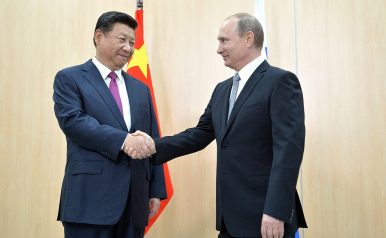By Catherine Putz
 Russia, a superpower a little past its prime, and China, a superpower ascendant, make an interesting match. Their relationship is not quite equal, Michał Lubina, an assistant professor at Jagiellonian University in Kraków, Poland, argues in his recent book, Russia and China: A Political Marriage of Convenience – Stable and Successful. But while it’s an asymmetric relationship, Lubina tells The Diplomat, it’s still a “win-win.”
Russia, a superpower a little past its prime, and China, a superpower ascendant, make an interesting match. Their relationship is not quite equal, Michał Lubina, an assistant professor at Jagiellonian University in Kraków, Poland, argues in his recent book, Russia and China: A Political Marriage of Convenience – Stable and Successful. But while it’s an asymmetric relationship, Lubina tells The Diplomat, it’s still a “win-win.”
This interview has been edited for length and clarity.
The subtitle of your book describes the Russia-China relationship as a political “marriage of convenience.” What does Russia bring to the marriage? What does China?
They bring the sense of security, stability, and predictability. They’ve learned from the Cold War’s bitter lesson that good neighborhood is better than enmity. They want to have their strategic rears covered so that they can concentrate on other, more important policy dimensions: the South China Sea for China and “near abroad” and Western Europe for Russia. To put it metaphorically: now Russia represents “peace from the north” for China while China is “peace from the east” for Russia.
Moreover, they mutually support each other on the international stage: as long as they do so, neither of them would be isolated on the global scene. In recent years we could observe this when China was sympathetic to Russian actions in Ukraine and Russia leaned toward China’s position on the South China Sea.
There are also commercial interests, from energy to arms (Russia is still the key weapons provider to China). This binds them. Despite the fact that economic relations are asymmetric in favor of China, from Russia’s perspective something is better than nothing. Moscow gets money for its resources and by cooperating with China can upgrade its bargaining position vis-à-vis Western European partners.
No comments:
Post a Comment